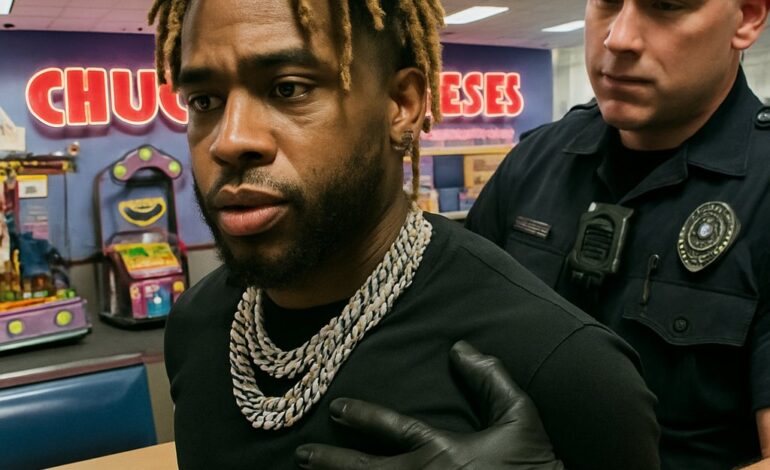Chuck E. Cheese Mascot Arrest Body Cam Released, Florida Cops Detain Jermell Jones Over Alleged Card Theft

Police body camera video released this week captures officers handcuffing a Chuck E. Cheese performer identified as Jermell J. Jones inside a Florida location, a surreal workplace arrest tied to an alleged debit card misuse exceeding 100 dollars.
My name is Zoe Bennett, and I parse fast moving headlines with careful sourcing, measured analysis, and clear takeaways. The facts matter, so let us start with what the footage shows and why it matters.
What the video reveals: The newly released body cam video, first shared by TMZ, documents officers rushing into a Chuck E. Cheese restaurant and arcade in July and moving directly toward the mascot in full costume. One officer quips to a nearby woman that “Chuck E. is a little busy,” seconds before the team grabs the character’s arms and attempts to bring them behind his back. The initial attempt to cuff the oversized suit proves awkward, and officers can be heard telling the performer to stop resisting and to avoid causing a scene as families and staff look on. Outside, after the takedown, the footage shows officers conducting a pat down and confirming what the performer is wearing beneath the fur and foam. The man protests that he is at work and needs to remove parts of the suit to comply, then ultimately pulls off the headpiece, shirt, and overalls while insisting he intends to cooperate.
Why police say they acted: As previously reported by TMZ, Jones was arrested in Florida on a charge related to theft of a credit card after a woman alleged that her debit card was used for more than 100 dollars in purchases. Booking details, reflected in public arrest records, show Jones posted a 1,000 dollar bond and was released. A formal plea was not described in the available reports at the time of publication, and no court disposition has been announced. The body cam video aligns with those earlier details, confirming the on site detention and the context of a workplace arrest.
Context and legal framing: Florida law criminalizes the unauthorized use or theft of debit and credit cards, and penalties can escalate based on the value of the goods or services obtained and the number of times a card is used. While the allegation here centers on more than 100 dollars in purchases, which may appear modest by headline standards, the charge itself is serious and can trigger additional consequences if prosecutors see patterns or aggravating factors. It is also a reminder that in many jurisdictions, financial crimes and identity based offenses draw heightened scrutiny because they ripple well beyond a single transaction.
Brand and workplace implications: For a family entertainment chain, optics matter. An arrest inside a venue during active business hours, and in costume no less, is likely to spark both safety questions and internal policy reviews. Body cam transparency gives the public a frame by frame account that can reassure some viewers about officer conduct, yet it also immortalizes a chaotic scene that brands prefer to keep off camera. As of this writing, no official statement from the company has been widely circulated regarding the incident, and there is no indication of disciplinary outcomes for the employee beyond the criminal case. Companies typically audit hiring and supervision protocols after incidents like these, revisiting background checks, training, and escalation procedures for on site law enforcement interactions.
Key takeaways from the footage: The video underscores how quickly a controlled arrest can become emotionally charged in a family setting. Officers attempted verbal direction, navigated the challenges of cuffing a bulky mascot suit, and then transitioned the suspect outdoors to minimize disruption. For viewers, the most striking image is the juxtaposition of a beloved children’s character with the tactile reality of police commands, handcuffs, and a removal of costume elements to ensure compliance. Those visuals are likely to drive strong engagement across platforms, and they will also be scrutinized for whether officers followed department policy on use of force and public safety inside a retail or restaurant environment.
Where the case stands: According to TMZ and corroborating public records, Jones posted a 1,000 dollar bond shortly after the July arrest and was released pending further proceedings. Details about future court dates or filings were not provided in the initial release of the video. The accused remains presumed innocent unless and until proven guilty in court, and any additional evidence, including receipts, surveillance recordings, or witness statements, would emerge through the legal process rather than social media clips.
Why this moment resonates: Body cam releases have become a centerpiece of public accountability, and they also compress nuanced situations into viral narratives. The Chuck E. Cheese setting magnifies that effect. It is a reminder that policing and public relations often collide in unexpected places, and that the most memorable images are not always the most complete. Responsible coverage requires holding two ideas at once, the spectacle of the footage, and the slower moving reality of court review and corporate policy checks that follow behind it.
What to watch next: whether prosecutors in the Florida jurisdiction escalate, modify, or drop the charge as more evidence is reviewed, whether the employer issues an internal update about staffing and training, and whether additional footage or records add context to the alleged debit card use. Until then, the video stands as an extraordinary snapshot of modern law enforcement intersecting with everyday entertainment. That wraps the analysis for now, but keep an eye on the docket, because this story is not done taking off the mascot headpiece just yet.
Sources: Celebrity Storm and TMZ, Police body camera footage, Public arrest and court records
Generated by AI




